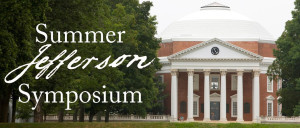Thomas Jefferson: An In-depth Look at the Man We Have Immortalized: Some Early Thoughts
Written by John Ragosta, Summer Jefferson Symposium Lead Faculty; Virginia Foundation for the Humanities, Fellow
The week of March 14 I spoke at several venues in Culpeper and Orange Counties about the development of religious freedom during and immediately after the American Revolution. Of course, Thomas Jefferson played a large part in those events, and for over 200 years he has been rightly immortalized by historians, Supreme Court justices, and the general public as one of the founders of American religious liberty (along with James Madison and eighteenth century Presbyterians and Baptists).
Preparing to talk about religious freedom and Jefferson’s iconic role got me thinking about the upcoming Summer Jefferson Symposium being offered at the University of Virginia this June.
For the past fifty years it has become fashionable among academics and pundits to criticize America’s Founders, sometimes viciously. Icons, like Jefferson, have taken the brunt of those attacks. Yet, when Leonard Levy wrote his scathing critique of Jefferson – Jefferson and Civil Liberties: The Darker Side (1963) – he began by recognizing the enormously important, principled, and consistent role that Jefferson played in the development of religious liberty. Even this unrelenting critic concedes that “Jefferson’s record on religious liberty was really quite exceptional,” his iconic status well-deserved. Religious liberty, then, is one topic that we won’t be talking about a lot during this year’s Jefferson Symposium.
What we hope to do is to take up the sometimes angry and vocal criticism of Jefferson for his actions, statements, and his inconsistencies concerning slavery, women, use of government power, treatment of political enemies and political allies…. Of course, to a large extent, either criticism or praise of Jefferson is easy. What we hope to do is to develop a greater understanding of the context of Jefferson’s actions and the challenges he faced, to understand the history, and the man we have immortalized. Certainly the goal is not to be an apologist for Jefferson (as if he needed one), but rather to be able to evaluate more clearly both his failings and, in spite of his very real and flawed human nature, his enormous and lasting successes.
Having a much richer and human understanding of Jefferson is not simply important for the academic historian. Providing deep historical context is equally important for all Americans as the words, principles, and image of Jefferson are increasingly used for political purposes, sometimes violent political purposes, in our times. Certainly Jefferson and the Founding Fathers are often very relevant to the problems that the republic continues to face, but their relevance can only be properly appreciated with a fuller and richer understanding of the context in which they operated. With such insights, both their successes and shortcomings become relevant, and we can better appreciate the wisdom that they can provide in the twenty-first century as well as the very serious limitations on the application of their wisdom to our times.
We will not be putting Jefferson back on a pedestal in June – he has certainly not been knocked-off by all of the criticism – but with some study we may be able to appreciate the real man, and what he might have to say to us, a bit more than the marble bust.
I hope that you will join us in June, and bring your questions concerning Jefferson. That’s what we hope to explore.
To find out more about Summer Jefferson Symposium 2016, or to register for the event, click here. Lodging is first-come, first-serve, and spaces are limited.
- Having a Drink With Your Donkey: The Absurd in Antiquity
- What Happens to UVA’s Recycling? A Behind the Scenes Look at Recycling, Composting, and Reuse on Grounds
- Finding Your Center: Using Values Clarification to Navigate Stress
- UVA Club of Atlanta: Virtual Pilates Class
- UVA Club of Fairfield/Westchester: Cavs Care - Food Pantry Donation Drive
- UVA Club of Charlottesville: ACC Football Championship Game Watch


